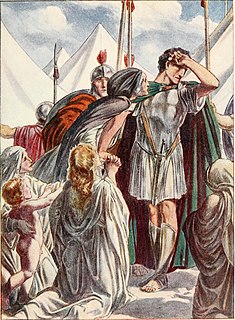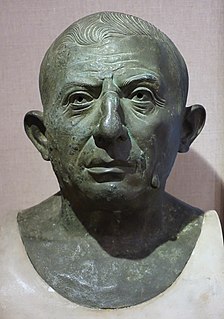Related Research Articles

Year 100 BC was a year of the pre-Julian Roman calendar. At the time it was known as the Year of the Consulship of Marius and Flaccus and the First Year of Tianhan. The denomination 100 BC for this year has been used since the early medieval period, when the Anno Domini calendar era became the prevalent method in Europe for naming years.

This article concerns the period 49 BC – 40 BC.

This article concerns the period 59 BC – 50 BC.
This article concerns the period 69 BC – 60 BC.
Year 46 BC was the last year of the pre-Julian Roman calendar. At the time, it was known as the Year of the Consulship of Caesar and Lepidus. The denomination 46 BC for this year has been used since the early medieval period, when the Anno Domini calendar era became the prevalent method in Europe for naming years.
Year 69 BC was a year of the pre-Julian Roman calendar. At the time it was known as the Year of the Consulship of Hortensius and Metellus. The denomination 69 BC for this year has been used since the early medieval period, when the Anno Domini calendar era became the prevalent method in Europe for naming years.
Quintus Caecilius Metellus Numidicus was an ancient Roman statesman and general, he was a leader of the Optimates, the conservative faction of the Roman Senate. He was a bitter political opponent of Gaius Marius. He was consul in 109 BC, in that capacity he commanded the Roman forces in Africa during the Jugurthine War. In 107 BC he was displaced from his command by Marius. On his return he was granted a triumph and the cognomen Numidicus. He later became a censor, entering into exile in opposition to Marius. Metellus Numidicus enjoyed a reputation for integrity in an era when Roman politics was increasingly corrupt.
Appius Claudius Pulcher was a Roman noble, general and politician of the 1st century BC. He was the father of a number of renowned Romans, most notable: the infamous Clodius and Clodia.

Quintus Caecilius Metellus Macedonicus was a statesman and general of the Roman Republic during the second century BC. He was praetor in 148 BC, consul in 143 BC, the Proconsul of Hispania Citerior in 142 BC and censor in 131 BC. He got his agnomen, Macedonicus, for his victory over the Macedonians in the Fourth Macedonian War.
Quintus Caecilius Metellus Pius was a Roman politician and general. Like the other members of the influential Caecilii Metelli family, he was a leader of the Optimates, the conservative faction opposed to the Populares during the last century of the Roman Republic.
Gaius Norbanus was a Roman politician who was elected consul in 83 BC alongside Lucius Cornelius Scipio Asiaticus. He committed suicide in exile at Rhodes after being proscribed by Lucius Cornelius Sulla shortly after the latter's victory in the civil war.

The gens Marcia, occasionally written Martia, was one of the oldest and noblest houses at ancient Rome. They claimed descent from the second and fourth Roman Kings, and the first of the Marcii appearing in the history of the Republic would seem to have been patrician; but all of the families of the Marcii known in the later Republic were plebeian. The first to obtain the consulship was Gaius Marcius Rutilus in 357 BC, only a few years after the passage of the lex Licinia Sextia opened this office to the plebeians.
Quintus Marcius Rex was a consul of the Roman Republic.
Lucius Caecilius Metellus Denter was consul in 284 BC, and praetor the year after. In this capacity he fell in the war against the Senones, and was succeeded by Manius Curius Dentatus.

Quintus Caecilius Metellus was a pontiff in 216 BC, aedile of the plebeians in 209 BC, curule aedile in 208 BC, magister equitum in 207 BC, consul in 206 BC, dictator in 205 BC, proconsul of Bruttium in 204 BC, and an ambassador at the court of Philip V of Macedon in 185 BC.
Lucius Caecilius Metellus was a Roman aristocrat. He was praetor in 71 BC. He succeeded Gaius Verres as governor of Sicily in 70 BC. He died in office as consul in 68 BC. His co-consul was Quintus Marcius Rex.
Gaius Caecilius Metellus Caprarius was a consul of the Roman Republic in 113 BC with Gnaeus Papirius Carbo. He served under Scipio Aemilianus in Numantia around 133 BC. He was praetor in 117 BC. His proconsulship in Thrace in 112–111 BC earned him a triumph. He was censor in 102 BC with his cousin, Quintus Caecilius Metellus Numidicus.

The gens Caecilia was a plebeian family at ancient Rome. Members of this gens are mentioned in history as early as the fifth century BC, but the first of the Caecilii who obtained the consulship was Lucius Caecilius Metellus Denter, in 284 BC. The Caecilii Metelli were one of the most powerful families of the late Republic, from the decades before the First Punic War down to the time of Augustus.
References
- ↑ Syme, Ronald (1963). "Ten Tribunes". Journal of Roman Studies. 53: 59.